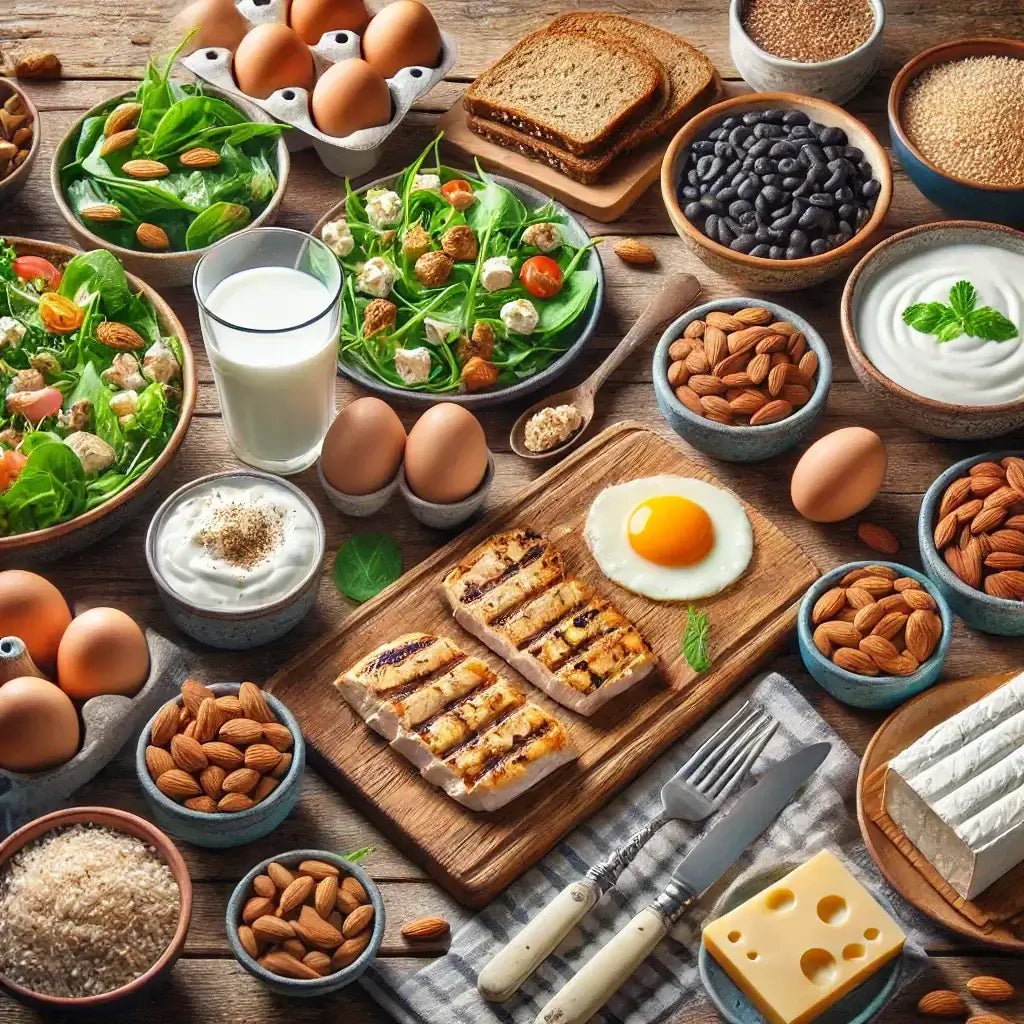Top 23 Foods to Naturally Boost Peptide Production for Healthier Skin, Muscles, and More

23 Foods to Keep Your Body’s Collagen and Peptides in Check 🥗
Collagen is basically the glue that holds your skin, bones, and everything else together. Peptides are small but mighty chains of amino acids that help with skin, muscle repair, and keeping your immune system in check. Sure, you could take a bunch of supplements, but eating the right foods is a much better way to keep your body from falling apart.
Why Food Over Pills? 🍽️
Your body is pretty good at making collagen and peptides on its own, but it gets lazier as you get older. Eating the right foods gives it the kick it needs to keep you looking and feeling decent, without having to choke down a ton of pills.
Peptides and Collagen: What’s the Deal? 🤔
Peptides might be tiny, but they’re powerful. They help keep your skin smooth, your muscles repaired, and your immune system running smoothly.
The Building Blocks: Amino Acids 🧱
If you want your body to make peptides, you need to feed it amino acids. There are 20 in total, but nine are “essential” because your body’s too lazy to make them on its own. You’ve gotta get them from your diet.
The Essential Nine:
- Histidine
- Isoleucine
- Leucine
- Lysine
- Methionine
- Phenylalanine
- Threonine
- Tryptophan
- Valine
Best Foods for Boosting Natural Peptide and Collagen Production 🍴
Here’s what to put on your plate if you want to keep your body producing collagen and peptides:
1. Bone Broth 🍲
Simmer some animal bones and drink the broth, or use it as a base for soups and stews.
2. Chicken Breast 🍗
Chicken breast, especially with the skin on, is packed with collagen. Grill it, bake it, or stir-fry it.
3. Fish 🐟
Fatty fish like salmon is rich in collagen, especially if you eat it with the skin on.
4. Eggs 🥚
Eggs contain all nine essential amino acids. Scramble them, boil them, whatever you like.
5. Citrus Fruits 🍊
Citrus fruits are full of vitamin C, which helps your body make collagen. Add them to your water or toss them in salads.
6. Berries 🍓
Berries are rich in antioxidants that protect your collagen. Snack on them or add them to your oatmeal.
7. Tropical Fruits 🍍
Tropical fruits are loaded with vitamin C and enzymes that help with collagen production. Slice them up for a snack.
8. Garlic 🧄
Garlic helps with collagen synthesis and gives your immune system a boost. Throw it in whatever you’re cooking.
9. Leafy Greens 🥬
Leafy greens like spinach are rich in vitamin C and magnesium, which help keep your skin and collagen healthy. Add them to salads or smoothies.
10. Beans and Legumes 🫘
Beans and legumes are a great source of plant-based protein for collagen production. Add them to salads, soups, or stews.
11. Nuts and Seeds 🌰
Nuts and seeds are packed with amino acids and minerals that help with collagen production. Toss them on salads, yogurt, or eat them straight.
12. Whole Grains 🌾
Whole grains like oats are a decent source of plant-based protein and essential amino acids. Have oatmeal for breakfast or add brown rice to your meals.
13. Quinoa 🍚
Quinoa is one of the few plant-based foods that offer a complete protein profile. Use it as a base for salads or as a side dish.
14. Tomatoes 🍅
Tomatoes are rich in lycopene and vitamin C, both of which support collagen production. Add them to salads, sauces, or stews.
15. Bell Peppers 🌶️
Bell peppers, especially the red ones, are packed with vitamin C. Add them to stir-fries or roast them.
16. Garlic and Onions 🧅
These veggies might stink, but they’re great for producing antioxidants that protect your skin. Add them to anything you cook.
17. Bone Broth (Again) 🍖
Yep, bone broth is so good it gets a second mention. It’s already loaded with collagen peptides.
18. Soy Products 🥢
Soy products like tofu are rich in genistein, an antioxidant that supports collagen. Use tofu in stir-fries or snack on edamame.
19. Spirulina 🌿
Spirulina is a type of algae that's rich in essential amino acids and peptides. Add it to your smoothies for a nutrient boost.
20. Mushrooms 🍄
Mushrooms, especially shiitake, support peptide production. Add them to soups, stews, or stir-fries.
21. Pea Protein 🧋
Pea protein is rich in amino acids like lysine, which is important for collagen production. Use it in smoothies or as a protein boost in your meals.
22. Red Meat 🥩
Red meat like beef is packed with glycine and proline, two amino acids essential for collagen production. Grill or roast it.
23. Oysters 🦪
Oysters are full of zinc, which is crucial for collagen synthesis. Enjoy them raw, grilled, or added to seafood dishes.
Stay Hydrated 💧
Your body needs water to keep everything running smoothly, including peptide production. Drink plenty of water, eat water-rich foods like cucumbers and watermelon, and go easy on dehydrating drinks like caffeine and alcohol.
Lifestyle Choices Matter 🏋️
What you eat isn’t the only thing that affects your collagen and peptides. Exercise, sleep, and managing stress are also important.
1. Exercise 🏃♂️
Exercise, especially resistance training, helps your body produce more growth hormone and peptides. So get moving!
2. Sleep 😴
Your body does most of its repair work while you sleep, including collagen and peptide production. Aim for 7-9 hours a night.
3. Stress Management 🧘
Stress messes with your hormones, which in turn messes with your collagen and peptides. Find ways to relax, whether it's through meditation, yoga, or just taking a breather.
Specific Peptides and What They Do 🔬
Besides the general stuff, there are some specific peptides with unique functions in your body:
1. DSIP (Delta Sleep-Inducing Peptide) 💤
Helps you sleep better and regulates your sleep cycle. You can support better sleep by eating foods rich in tryptophan, like turkey and oats.
2. BPC-157 (Body Protection Compound-157) 🛡️
Known for healing properties, especially in the gut, muscles, and tendons. Support healing with anti-inflammatory foods like bone broth and omega-3s.
3. Thymosin Alpha-1 🦠
Supports your immune system. Boost it with vitamin C-rich foods, garlic, and mushrooms.
4. GHRP (Growth Hormone Releasing Peptides) 💪
Stimulates the release of growth hormone, essential for muscle growth and tissue repair. Eat protein-rich foods like lean meats and nuts.
5. Melanotan II 🌞
Stimulates melanin production for tanning. Support your skin with antioxidant-rich foods like berries and leafy greens.
6. Collagen Peptides 🧩
These are the building blocks of collagen. Eat collagen-rich foods like bone broth and vitamin C-rich foods to help your body out.
7. Thymosin Beta-4 🩹
Helps with tissue repair, especially in muscles and the heart. Support muscle repair with protein-rich and anti-inflammatory foods.
Should You Take a Collagen Supplement? 💊
Eating a collagen-rich diet is your best bet, but if you’re not getting enough or need a quick fix, supplements can help. Just be sure to check with a healthcare provider before you start popping pills.
Conclusion 🎯
If you want to keep your body’s collagen and peptide production going strong, focus on eating a balanced diet, staying hydrated, exercising, getting enough sleep, and managing stress. It’s simple and way more effective than relying on supplements alone.

